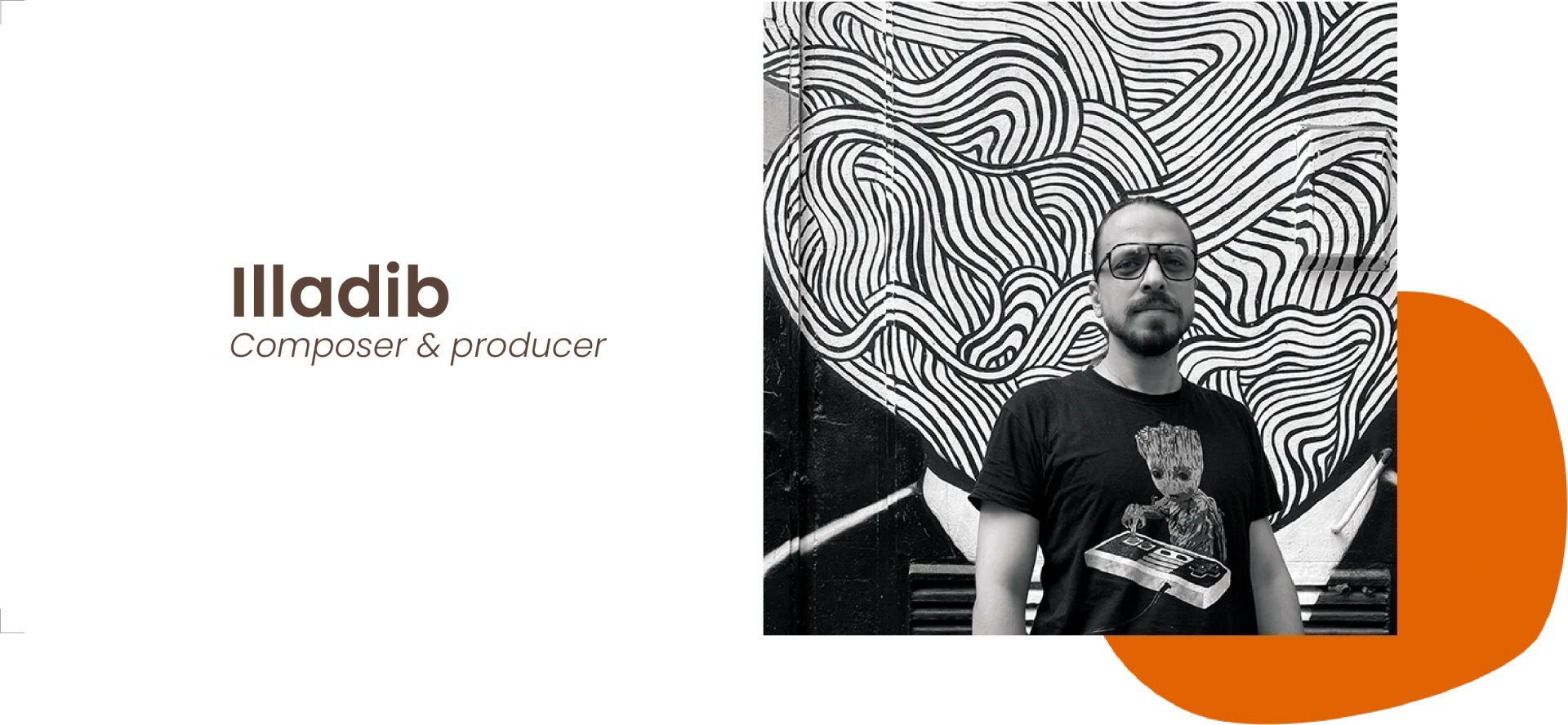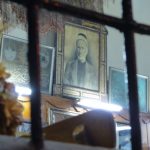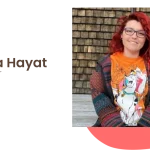ILLADIB, a Syrian composer and music producer now based in Istanbul, crafts his unique blend of experimental and hip-hop music. He describes his artistic identity as profoundly shaped by his involvement in the Syrian Humming project. A global collaboration between scholars and displaced Syrian artists, this project taps into personal and collective memories of food and everyday life, weaving together music, storytelling, and visual art.
A new project, Jannah, Jannah (Paradise, Paradise), continues along this path, intertwining the voices and experiences of displaced Syrian communities in Istanbul with a shared artistic vision.
How can someone living in poverty and fear envision their homeland, left behind, as a paradise—even in their dreams? While the media often focuses on the tragedies faced by refugees, the artists, storytellers, and musicians involved in Jannah, Jannah choose to work with dreams and hopes instead.
ILLADIB spoke with ‘Qisetna’ about this project.
What is Jannah, Jannah to you?
To begin with, Jannah, Jannah is a participatory storytelling project, and its paradise is a non-religious concept tied specifically to Syria, our homeland. Through the stories of different people, we explored how their lives shifted between Syria and life abroad.
In simple terms, it’s a project that combines music, storytelling, and art to express how this non-religious paradise can be felt and achieved for Syrians.
For me, Jannah, Jannah is a space for several artists to collaborate and share ideas.
We came together to explore the meaning of “Jannah, Jannah” (two paradises), especially since the song became a chant during the 2011 protests in Syria.
I was wondering about the connection. Could you please tell us more about this song for our non-Syrian readers?
Jannah, Jannah is an Iraqi song by Ridha Al-Khayyat from 1982. Initially, it was meant to portray Iraq under Saddam Hussein as a paradise, Jannah.
In 2011, as the conflict in Syria began, a song became popular among peaceful protest leaders like Abdel Baset Al-Sarout, especially in Homs. It came to represent freedom, solidarity, and unity. For Syrians, this song carried a message of hope. A message that when we stand together, united against the regime, we can create the homeland we dream of living in; that the homeland can be a paradise.
So what are the two paradises of Jannah, Jannah?
If we focus on the first paradise experienced in one’s homeland before leaving Syria, and the second paradise sought after leaving, what changed between the two?
Inevitably, we dive into themes of displacement, migration and survival.
How can someone living in fear, anxiety, and poverty see their homeland as a paradise, even in their dreams?
This is the question we continue to examine throughout the project.
What’s your understanding of paradise?
My paradise is happiness.
No more negativity, violence, hatred, bloodshed, racism, and the many issues that fill our daily lives through the media.
What would you call Jahannam (Hell)?
Jahannam, from a non-religious perspective, represents the opposite of paradise.
I believe we are currently living in a hell of wars and their consequences. Survivors escaping death become refugees. With limited possibilities, those people are imprisoned within the borders of a defined geographical map without any privileges or rights to life, battling their fears and anxieties.
How did this understanding influence your approach to music?
I believe every artist is influenced by their surroundings in some way. Even if their main focus isn’t there, they are still connected to certain roots and states that shape them.
When composing, I share the emotions I feel in the moment, connecting them to the text, and aligning those feelings with the message in the words, their story.
As a musician, I find paradise in every hour I create or produce music.
For me, music is my paradise.
How did the collaboration with other artists impact the direction of your work?
Collaborating with other artists is always a challenge, it also helps to create something new. I love it and have worked with many artists, especially in Arabic hip-hop.
The Jannah Jannah project is different from what I usually do, it’s neither electronic music nor hip-hop. I found it to be more like a short podcast, though not in the true sense.
We tell a story, and the music supports its overall atmosphere.
In the first part of Jannah Jannah, the music played more of a supporting role, but in the second part, it became the main focus.
How do you translate the emotions and experiences of the Syrian community into your music?
I don’t see our role in the project as translating the emotions of the Syrian community.
That’s a heavy burden, and no one can bear it.
I believe our main role is to document, especially now, as the events since 2011 risk being forgotten. The struggles of the Syrian community are still ongoing today. Our role as artists is just as important, even if it takes on different forms.
The true story must reach the entire world.
What musical techniques or elements do you use?
As a musician, my role is to experiment with sounds that fit the story’s context. In the first segment, the dialogue was the foundation and music simply supported the emotions.
In the second segment, however, music became the main force driving the story.
I also used many live-recorded audio clips from Istanbul. I love recording live sounds! I’ve used the sounds of Istanbul streets and ferries, even conversations by the sea.
As a Syrian artist living in Türkiye, how has the experience of displacement shaped your creative process?
Living in Türkiye has definitely helped me grow my talents and skills, but it wasn’t easy.
I came here in 2014. I am settled in Istanbul under temporary protection.
I started learning music around 2015-2016, mostly using YouTube—one of the few advantages here, in Türkiye, is having access to it.
Developing artistic skills and growing one’s talent takes time, especially when you’re working in a completely different field to make a living.
Opportunities for artists are always scarce, especially with little support or assistance.
How would you define yourself in one phrase?
Survivor!
Oh. Is it somehow different from the words you could have used, say, 10 years ago?
Of course, there’s always room to grow, explore new ideas, and expand horizons.
This growth keeps my art evolving, it’s always different. It also makes me feel satisfied.
Because of my art, I am happy with everything I’ve experienced over the past 10 years.
If you were to select, what personal experiences of the past define you as a human being right now?
The war. It’s a massive experience. War makes you seek a way to survive, it also teaches you how to appreciate the value of life.
Do you draw inspiration from art forms, artists, and styles that you can refer to as “specifically Syrian”?
Of course, all around the world, there are many talented Syrian artists. For example, Cipher, an album by Hello Psychaleppo, blends electronic music with Tarab influences and includes great collaborations.
Another group that has recently caught my attention is the new band Jazeera 10. Some members of this band were previously part of Khebez Dawle, known for creating one of the most beautiful Syrian rock albums. Now, they’re presenting a new style that captures the nostalgic spirit of the ’80s and ’90s.
What is art for you?
For me, art is a magical tool. It’s a language, and one can use it to convey their message, express their feelings and share experiences.
It can also be a medium for introspection. In this case, it’s a way to reflect and focus while composing music, creating sounds, and refining the final piece. It’s an essential part of the creative process.
Art helps people understand their emotions and themselves. It breaks down barriers to self-communication, helping them notice both good and bad feelings. This starts a “friendship” with oneself. When people know their own needs, it becomes easier to connect with others and learn about different cultures.
Rina Repina




1 comment
[…] ILLADIB | Composer & producer Sara Hayat | Illustrator Mohammad Orwani | Podcast designer & Storyteller […]